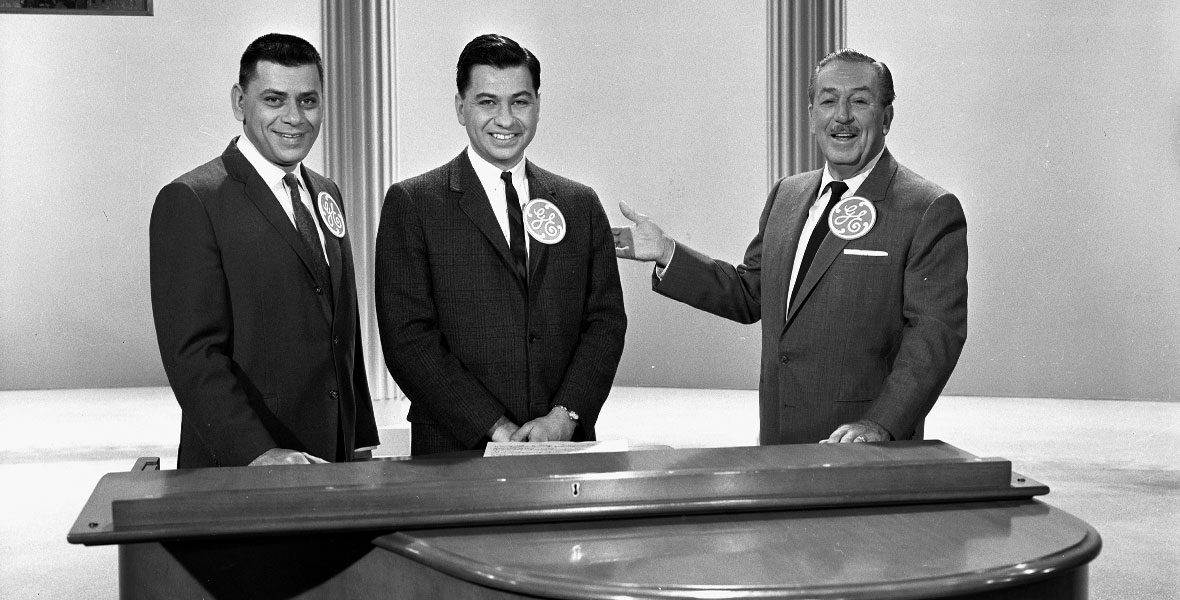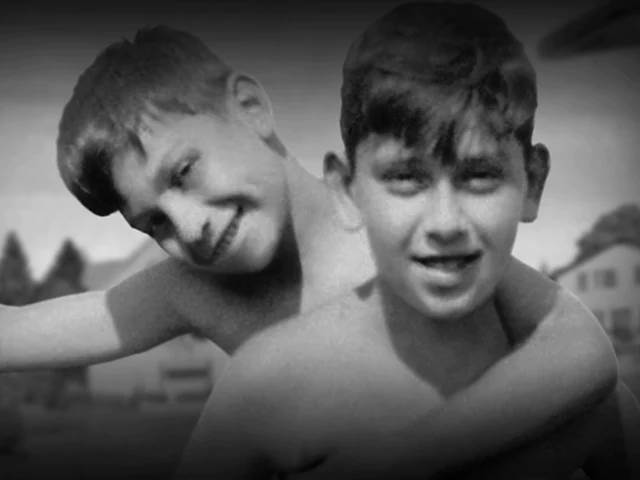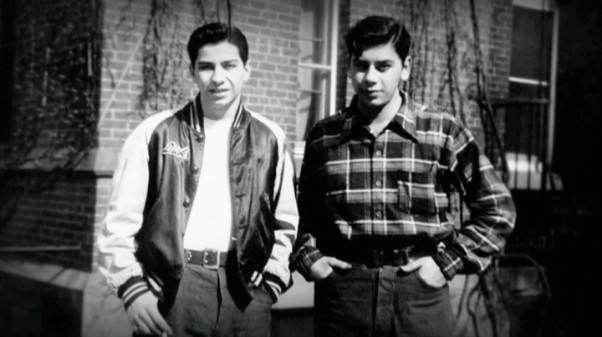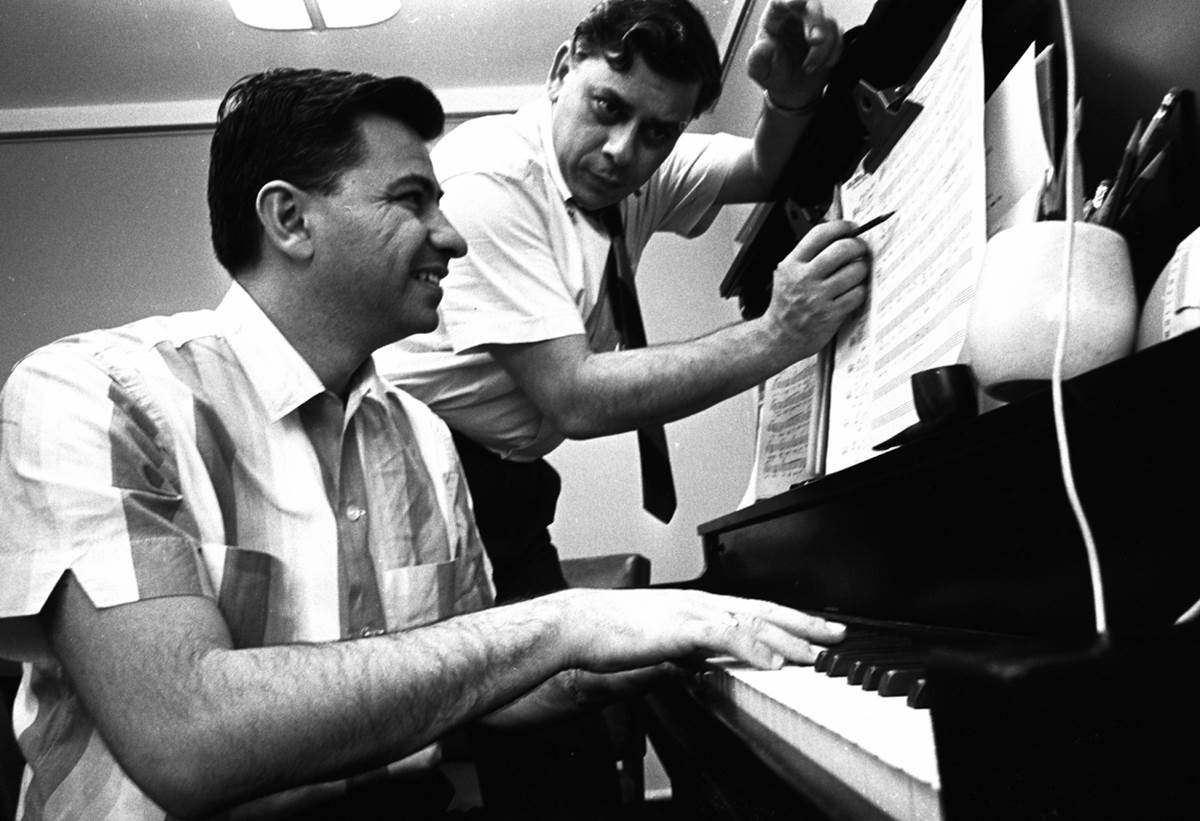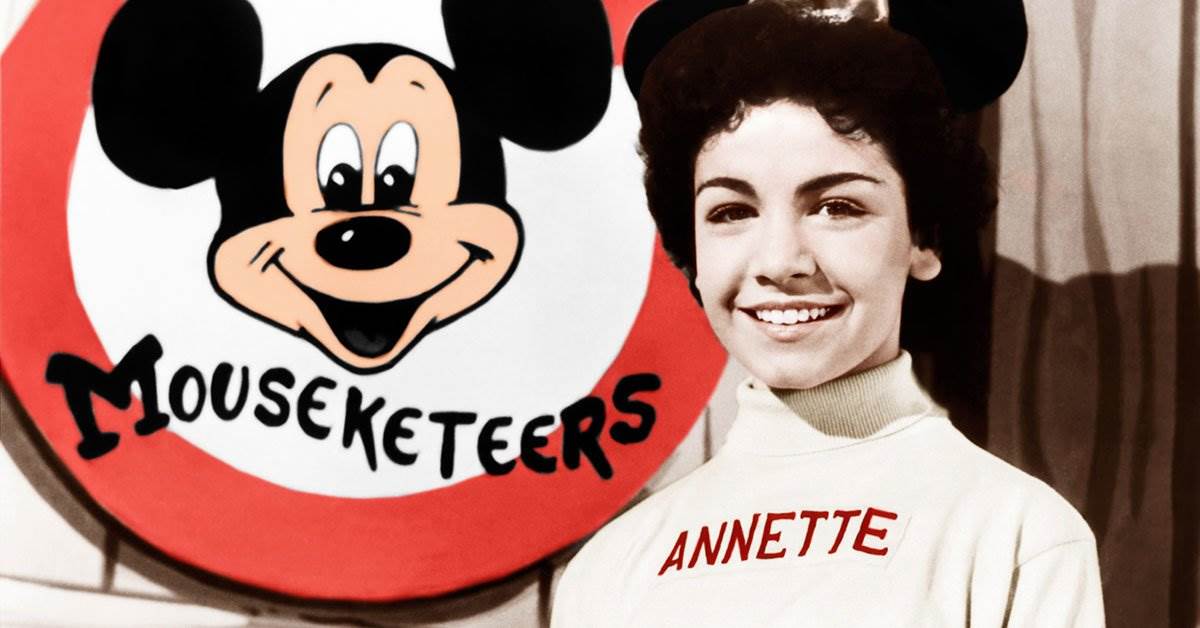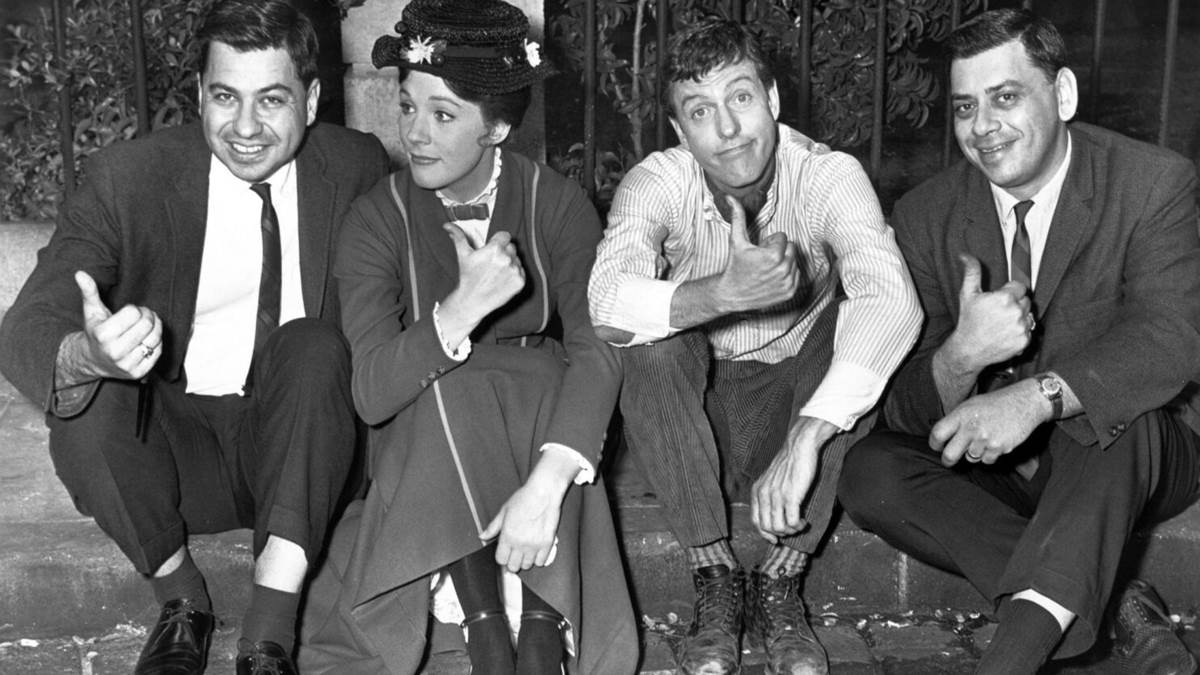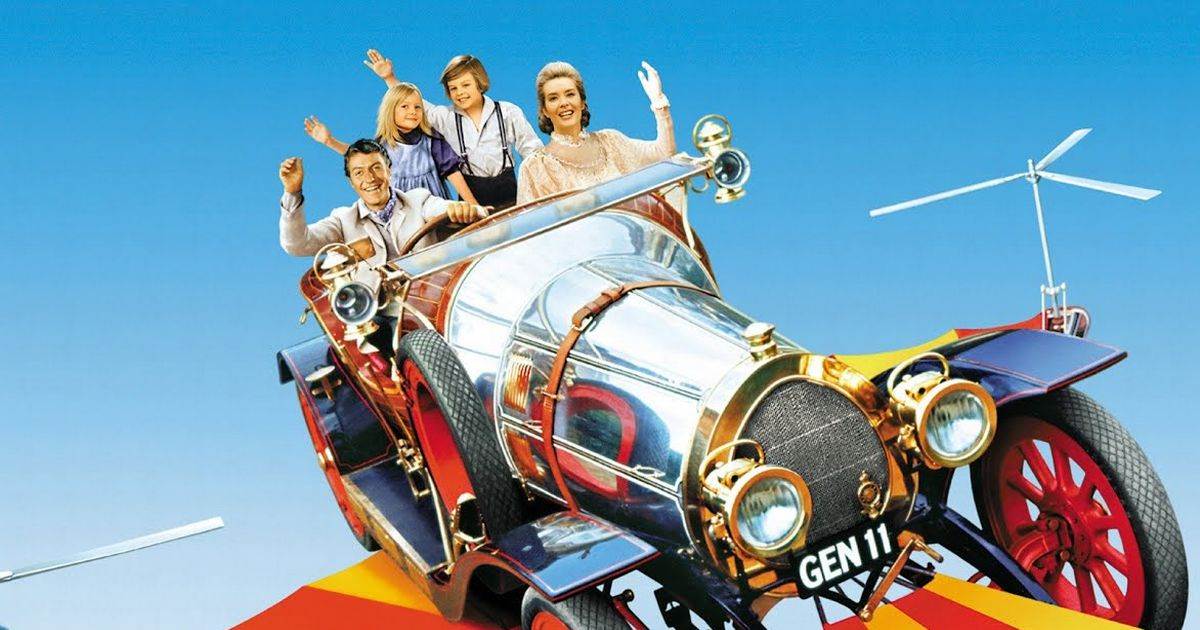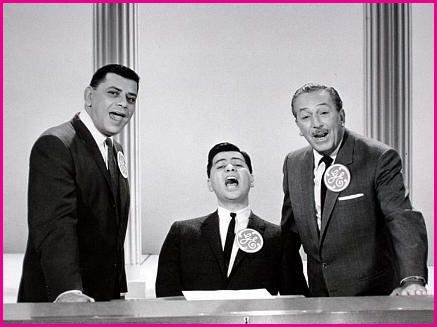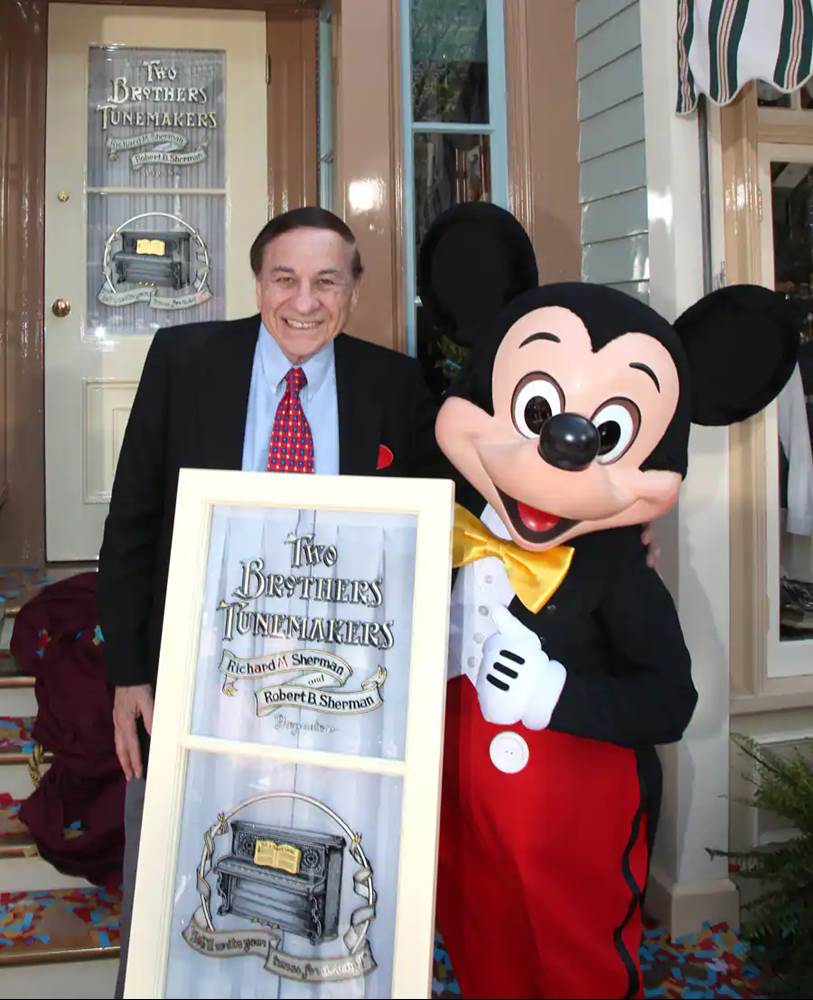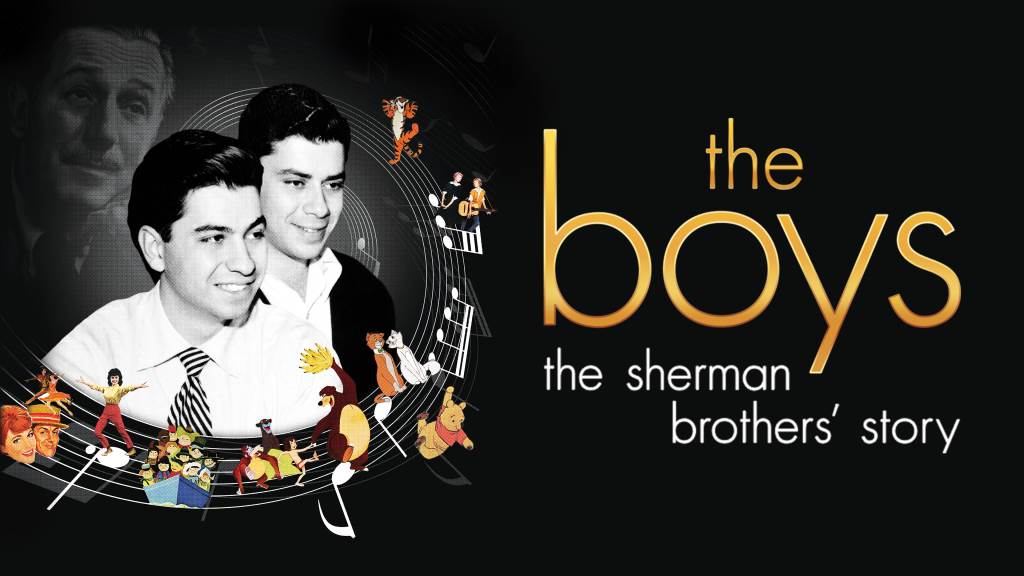Disney Legends Spotlight: The Sherman Brothers
You know this song! And you know that song! Heck, you even know those other three too! But do you know who wrote the songs? Who created the magic in that music? Only once in a generation does a prolific music artist emerge to grace the world with hundreds of unforgettable melodies, singable lyrics, and a positive spirit that cannot be snuffed. In this edition of Disney Legends Spotlight, let’s talk about TWO of these artists - the iconic Sherman Brothers.
Image: Disney
For over seventy years, Richard and Robert Sherman have occupied a unique place in the Great American Songbook. Their music and lyrics have contributed to films, the stage, television, and even theme parks. And if you are a fan of Disney music, you undoubtedly know dozens of their tunes (one or two of which have even been dubbed “earworms" for their persistence inside the head of often-unwilling recipients). Let the music of the beloved Sherman Brothers live rent-free in your head while we learn more about “The Boys."
Musically Inclined
Richard and Robert Sherman were born in the mid-1920s of Russian-Jewish immigrants living the American dream in Manhattan, New York. Robert, the elder of the two, was born in December 1925, while Richard followed in June 1928. The brothers were the sons of Tin Pan Alley songwriter Al Sherman, who wrote many popular songs for stage and screen during the Great Depression.
Image: Disney
As a child, Richard suffered from a chronic asthmatic condition which, at the time, was best treated by living in a more temperate climate than New York. The Shermans bounced back and forth between New York and California for several years, as Al tried to balance Richard’s health needs with his own career goals(which still resided primarily in New York). In 1937, the Shermans settled permanently in Beverly Hills, where both boys attended high school.
School Days
While attending Beverly Hills High School, Robert wrote and produced radio and stage plays. He joined the Army in 1943, at age 17. In 1945, Robert led the first squad of soldiers to liberate the Dachau concentration camp. In his autobiography “Moose" Robert frighteningly noted that “In a half hour I saw enough to fill my nightmares for the rest of my life." While in battle, he was shot in the knee and removed from active duty. The injury forced Robert to walk with a cane for the rest of his life. He recuperated in Great Britain, where he developed a lifelong love of English culture.
Image: Disney
Upon his return to the United States, Robert was awarded a Purple Heart for his service and sacrifice. After his service in the war, he attended Bard College and obtained degrees in both English Literature and Painting. He continued to create in both these media for the rest of his life, though it was his music that would be shared with the world.
Younger brother Richard became fascinated with music while in high school, and he studied several instruments, including the flute, piccolo, and piano. Following high school, he went straight to Bard college. Like his big brother, Richard also served in the Army, where he enjoyed an esteemed position as conductor for the Army band and glee club from 1953 until 1955. With his service time coming after the end of World War II, Richard didn’t experience the same intense fighting experiences as his brother.
The Challenge of Success
In 1951, the brothers seemed to struggle a bit in finding success. Their musically-inclined father challenged his sons with a bet. As Richard recounts, "'I bet you couldn't team up together and write a song that some kid would give up his lunch money to buy a record of it.' He said, 'yeah, I don't think you have enough brains to do that.' And then he turned around and left." The boys answered the challenge, and the rest would become Hollywood history.
Image: Disney
The brothers’ very first song - written in 1951 - was “Gold Can Buy You Anything But Love." The song was recorded by “The Singing Cowboy" Gene Autry, and was played daily on his radio show in the early 1950s. Not a bad first effort!
The brothers continued to create music while Richard spent his time in Army service, and reunited upon his return to civilian life. In 1958, Robert founded the music publishing company Music World Corporation. The small company would eventually form a relationship with Disney's BMI-affiliated publishing arm, Wonderland Music Company, where the Sherman’s would create some of their most memorable material.
The Shermans’ first U.S. top-ten hit came with 1958’s "Tall Paul" - sung by a Mouseketeer you may have heard of - Annette Funicello. The song shot up the charts to #7, and started a relationship between her and the Shermans that would produce several other top-ten hits - and catch the attention of Walt Disney.
Image: Disney
The Shermans struck international acclaim with the 1960 hit "You're Sixteen." The song was first recorded by rockabilly singer Johnny Burnette, and found a second life in 1973 for Beatle Ringo Starr.
The Disney Years
With the nation’s most popular Mouseketeer consistently topping the charts - thanks in part to the Shermans - Walt Disney partnered with them in 1961. The brothers’ first assignment was "Strummin' Song" in 1961, created for Walt’s Disneyland television show, as part of a two-part episode titled The Horsemasters. Also in 1961, the brothers created their first song for a Disney film - "Medfield Fight Song" from The Absent-Minded Professor. The Shermans closed out an exceptional rookie season working for Walt with the Hayley Mills hit The Parent Trap. It would be the first of several collaborations with the Disney Legend, including In Search of the Castaways (1962), Summer Magic (1963), and That Darn Cat! (1965).
A Spoonful of Success
1964 saw arguably the most popular effort in all of the Sherman Brothers’ career, with Walt Disney’s Mary Poppins. The whimsical film about a magical nanny (and her trusty friend Bert) saving the heart of a family in need garnered the brothers two Academy Awards - Best Score, and Best Song for "Chim Chim Cher-ee." But don’t short change the other Practically Perfect musical masterpieces, including “A Spoonful of Sugar," "Supercalifragilisticexpialidocious," and Walt’s favorite "Feed The Birds", which he personally requested the brothers play on many an occasion at the studios. As Robert Sherman recalled, “The point of the song—that it doesn’t take much to give a little kindness—was what really registered with Walt."
Image: Disney
Of course, working on Mary Poppins wasn’t all sugar and rainbows. The 2013 Disney semi-historical film "Saving Mr. Banks" depicts how the famously difficult author P.L. Travers was deeply unhappy with Disney’s adaptation of her book. She was especially disdainful of the songs written by the Sherman Brothers.
Travers spent two weeks working with (mostly arguing with) the brothers. According to Richard "Mrs. Travers was very difficult. ... I never had such trouble. (The film) was a joy to work on after we finally got the rights. It was a dream cast. But those two weeks I would hate to go through again." In a separate interview, Richard told the New York Times "She didn't care about our feelings, how she chopped us apart."
Ultimately, the film became a beloved classic, albeit administered through an experience that - even decades later - still leaves a bad taste in their mouths. The medicine fed from P.L. Travers proved to be a far cry from “A Spoonful of Sugar."
Scores of Disney Films
Aside from Mary Poppins and the Hayley Mills films, the Sherman Brothers created music for many other Disney films during their heyday, including The Sword in the Stone (1963), The Happiest Millionaire (1967), The Jungle Book (1967), The One and Only, Genuine, Original Family Band (1968), The Aristocats (1970), and Bedknobs and Broomsticks (1971).
Fine Four-Fendered Friend
The Shermans’ first non-Disney film work came with the 1968 classic Chitty Chitty Bang Bang, starring Disney Legend Dick Van Dyke. The magical tale of the adventures surrounding a flying car earned the brothers their third Academy Award nomination - Best Original Song - for its title tune. The film went on to enjoy a second life in theater, hitting the London stage in 2002 to rave reviews. The show went on to become one of the most successful stage shows ever produced at the London Palladium. In 2005, a second theater company premiered the show on Broadway in New York City. The Sherman Brothers wrote an additional six songs specifically for the stage productions.
Image: United Artists
The Sherman Brothers branched out from Disney fare in the 1970s to work on other projects, including more motion pictures (Charlotte’s Web and Snoopy Come Home, among many others) and musicals (Over Here!). In their later years, the Shermans returned to Disney films with The Many Adventures of Winnie the Pooh (1977), The Parent Trap (1998), The Tigger Movie (2000), and Christopher Robin (Richard Sherman - 2018).
Disney Parks Magic
The Sherman Brothers didn’t stop on the screen or stage. Richard and Robert are also among the most respected creators of music in Disney Parks attractions. Their work on attraction music began during Disney’s most prolific period of Imagineering, in preparation for the 1964-65 World’s Fair in New York. The brothers penned the themes for two of Disney’s four attractions at the fair, including “There's A Great Big Beautiful Tomorrow", for the General Electric (and later Walt Disney’s) Carousel of Progress, and “It’s a Small World (After All)" from the Pepsi/UNICEF attraction “it’s a small world." Richard has since described “Small World" as a “prayer for peace."
Image: Disney
Other Sherman Brothers tunes immortalized in the Disney Parks include "Miracles from Molecules" from Adventure Thru Inner Space, “The Many Adventures of Winnie-the-Pooh",
“In the Tiki, Tiki, Tiki Room" from Walt Disney’s Enchanted Tiki Room, “One Little Spark" from Journey Into Imagination, “Makin’ Memories" from Magic Journeys, "The Astuter Computer Revue" from the CommuniCore pavilion at EPCOT, and "Magic Highways" from Rocket Rods. The brothers also wrote a replacement song for Walt Disney’s Carousel of Progress called "The Best Time of Your Life", which played in Walt Disney World for years until the original attraction song was restored in 1993.
The Later Years
Infatuated with the United Kingdom since the days of his military recuperation, Robert Sherman moved from Beverly Hills to London, England in 2002. Robert lived out his remaining days in a place he always loved, and died there in March 2012. His autobiography Moose: Chapters From My Life includes memoirs from various points in his life. The collection was released posthumously by his son Robert.
Richard Sherman remained in Beverly Hills, and he continues to create music into his 90s (and counting). He contributed new lyrics to King Louie’s “I Wanna Be Like You" for the 2016 live-action adaptation of The Jungle Book, and wrote three songs for 2018’s Christopher Robin. In 2015, Richard composed the song "A Kiss Goodnight" as the exit music for the Disneyland Forever fireworks show, which ran during the park's 60th anniversary celebration.
Together, the brothers authored a 1998 autobiography, Walt’s Time: From Before to Beyond, which details their careers, before, during, and after their time with Walt Disney.
A Lifetime of Honors
Accolades and acknowledgements have poured onto the Sherman Brothers throughout their career. The pair received a star on the Hollywood Walk of Fame in 1976 and were named Disney Legends in 1990. They were inducted into the Songwriters Hall of Fame in 2005, received the National Medal of Arts in 2008, and received the "Career Achievement Award" at The Theatre Museum's 2010 Awards Gala in New York City.
Image: Disney
Perhaps most special to Disney theme park fans, on March 11, 2010, the Sherman Brothers were presented with a specialized window on Main Street, U.S.A., at Disneyland to honor their contribution to Disney theme parks. The window lovingly reads “Two Brothers Tunemakers," with their names inscribed beneath.
Two Brothers, Two Legends
Over the course of their career, the Sherman Brothers wrote more motion-picture musical scores than any other songwriting team in film history. During their 13-year career at Disney (1960-73), they received four Academy Award nominations and a Grammy award, and wrote more than 200 songs for 27 films and two dozen television productions.
May 22, 2009 saw the release of The Boys: The Sherman Brothers' Story - a critically acclaimed documentary film about the brothers. The film was a joint venture directed and produced by their sons, Gregory V. Sherman and Jeff Sherman, and was distributed by Walt Disney Pictures. The Boys chronicles the brothers’ life and careers with almost brutal honesty. In addition to the success and the accolades, the film documents the often strained relationship the brothers shared. In fact, Robert’s son Jeff has even speculated that the friction between his father and his uncle may have been what brought their songs alive.
Image: Disney
No relationship is perfect. The Sherman Brothers faced their own individual hardships, as well as the challenge of collaborating as a pair, and as brothers. Enough has been written about their personal relationship, that one may conclude that the two were constantly feuding, not unlike Paul McCartney and John Lennon, or even Walt and Roy Disney. But in the end, the brothers shared an undying love for creativity and for each other. And out of this love, the Sherman Brothers penned some of the most memorable songs of all time.
Do you have a favorite Sherman Brothers tune? Let us know with a comment, either here or on social at:
Check out more Disney Legends in our spotlight collection.
Sources:
Disney D23 Legend Page - Richard Sherman
Disney D23 Legend Page - Robert Sherman
The Boys: The Sherman Brothers' Story (2009)
The Untold Truth of the Sherman Brothers - Grunge - July 22, 2022



